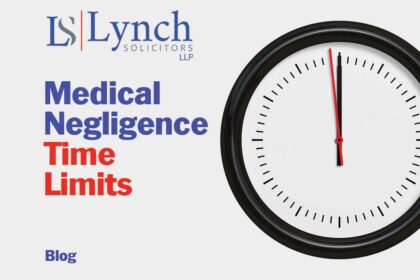
It is important to be aware that there are certain time limits in medical negligence within which a claim can be made. The Statute of Limitations is the length of time a person has to make a claim following an incident that gives rise to the claim.
Once the specified time has passed an action can no longer be brought. The logic is simple and grounded in common sense principles: after a certain length of time it is impossible to get accurate evidence – be it witnesses, people’ s recollection, etc. and the threat of legal action cannot hang over a person for an indefinite time.
Therefore, the law stepped in with the concept of the Statute of Limitations.
How long does a person have to take action?
The legal time limits vary depending on the area of law:
- A personal injury claim has to be made within two years;
- You have three years for a product liability claim;
- Six years for a breach of contract claim;
and so on.
The Statute of Limitations may also work negatively against someone, for example with squatter’ s rights after a certain time period – 12 years, or 30 against the State – a person may lose their land or property to a squatter who has been in possession of it for this length of time.
Generally, if a person is outside the limitation period they cannot take action.
What if you didn’t know you had a case or didn’t know you were injured?
There is an exception to the strict 2-year statutory time limit for personal injuries.
The concept of ‘ date of knowledge’ extends the time until you know or ought to have known that you had a case.
The ‘date of knowledge’ test provides that the two-year period within which you have to bring your personal injury claim will not begin to run against you until the date upon which you became aware or ought to have known of certain facts, such as :
-
You have a significant injury.
- The injury is attributable to a negligent act.
The date-of-knowledge test can prevent injustice from occurring in many scenarios. Take, for example, a situation where a doctor prescribes a patient with inappropriate medication over a period of time which has the effect of causing them serious organ damage. While the injury may be very serious in nature, it might well not manifest itself for several years.
If the patient does not begin to experience serious symptoms until three years after the medication has been taken, an absolute application of the two-year rule would mean that any claim against the doctor would be barred by the Statute of Limitations, notwithstanding the fact that the patient couldn’t possibly have known that they were the victim of medical negligence at any time in that two years.
The date of knowledge has been applied in other medical negligence cases – a person who receives a negligent medical procedure may not have knowledge of the injury at first until the injuries cause problems or they become aware that such problems arose as a consequence of such procedures. The ‘date of knowledge’ ensures that the time limit does not run out before a person realises they have an injury/action.
It is incumbent on a person to make enquiries where they have reason to question the care they have received. However, it is commonly the case in medical negligence cases that a person will not know that they have the broad outline of a case until they receive an expert medical opinion.
Is the limitation period ever suspended by the court?
The court has retained an inherent jurisdiction even when proceedings are issued within the time allowed but are progressed slowly. If the court decides that there is inordinate and inexcusable delay which has prejudiced the person defending the claim the Court may dismiss the case for want of prosecution.
- On the other hand, the limitation period can be suspended due to disability i.e. if someone is injured to the extent that they are not capable of managing their affairs.
- For an incident concerning a minor, the limitation period begins once the child has reached maturity (18 years of age).
- A further suspension can occur if there is fraud, concealment or mistake.
- The clock can also be stopped if a case is not taken on the basis that the defending party leads a claimant to believe that they have admitted liability.
If I have suffered an injury, how can I ensure the time limit I have to make my claim will not expire?
If you believe there is an issue, it should be flagged immediately.
You must begin your investigation and be conscious of time restraints. It must be highlighted that the Statute of Limitations comes into effect when you know that there is an issue and not that there is a legal case to pursue.
This may be considered as a certain ‘grey area’ however, the importance of the statute most certainly is not.
In any case where there is a doubt, you should go about taking the necessary legal steps and required paperwork immediately.
Contact Us
We can assist you with any legal issue. Talk to us by calling us on 052 61 24344 or emailing us: reception@lynchsolicitors.ie

